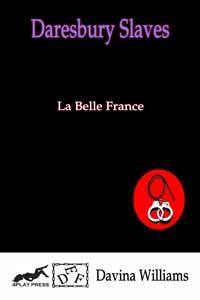
EXTRACT FOR
La Belle France
(Davina Williams)
EXTRACT- LA BELLE FRANCEAnna
Crichton worked for the BBC as a freelance journalist. She was currently working the late night news
slots during which she interviewed someone who had made the news during that
week. On the night that preparations for
a trip to France were finalised in Daresbury, she interviewed Ernest Robbins MP
a prominent backbencher who was campaigning for the introduction of universal
female enslavement. The
interview ran reasonably smoothly till she asked him if he considered his
proposal to extend female slavery through the use of ministerial orders to be a
breach of the democratic process. Robbins called her a feminist cow and then,
when she protested, he appeared to lean forward and squeeze her left
breast. The incident lasted only a few
seconds and Robbins seemed contrite at what he had done. But the situation escalated when Anna slapped
him hard across the face and called him a male chauvinist pig. BBC
security guards separated them and on Robbins request the police were
summoned. Both of them were arrested on
charges of assault. Robbins protested his innocence but Crichton went quietly. The
case against Anna Crichton had to be accelerated under the Amendment Act but
because Robbins' case was directly related to hers, his case was also
accelerated. Therefore, the following day both of them appeared at the London
Crown Court. Robbins
pleaded guilty and was given a sentence of three months' imprisonment, which
was suspended for a year. Crichton pleaded self-defence but was also convicted
and sentenced to 50 strokes of the senior cane, plus enslavement, with a
minimum length of five years. Crichton
immediately appealed and the case went straight to the Supreme Court because of
the double assault convictions. Crichton
argued that the sentences were totally disproportionate. Robbins had sexually assaulted her first and
he had been virtually let off, or so she claimed. She had been sentenced to a possible lifetime
of slavery and was to receive 50 strokes of the cane. The
judges asked to see a replay of the incident using the BBC's own recordings. The President of the court agreed that she
had indeed been assaulted and it was only reasonable to expect some
reaction. However, by the time that
reaction came there had been a significant pause and, as a result, he concluded
that her reaction was not instinctive but considered. He took into account that previous judgements
before female enslavement had allowed that for women the reaction might indeed
be delayed but, on balance, he felt that the conviction was justified. The
key significance of the case was that he then introduced a new penalty into the
law. Up till then, enslavement sentences
could only be ended by the owner freeing his or her slave or someone paying the
manumission fee to enable the slave to buy her freedom. The President of the Supreme Court upheld
Crichton's enslavement but reduced its period from a maximum of life to a
limited period of three months. He also
reduced the caning from fifty to twenty strokes. He
concluded by saying that such a sentence would only be used rarely but as there
was clear evidence that she had been assaulted, he could not in equity hand
down a much more severe sentence to her.
He declared that considered retaliation should draw a more serious
response. If Crichton had not slapped
Robbins, she would have gone free. The
three-month enslavement was punishment for that retaliation, as was the twenty
strokes of the cane. He ordered that
Crichton should serve her sentence as a slave of the BBC and that her caning
should be carried out at a suitable PPFP (Public Place of Female
Punishment). Crichton was required to
strip and taken off gagged and in chains.
It
later became known that he was something of a sports fan and his judgement had
been influenced by the treatment of retaliation in the infringements of
sporting rules. The
BBC already had a use for her. It was an
assignment that she had already turned down but now she had no right of
refusal. Arrangements were quickly made
to have her attached to David Williams party to travel to France. The BBC and other broadcasters had wanted to
do an exclusive interview with David for some time. Now the BBC could offer something that the
others could not. A slave for three months
for his own use. The only restriction
was that he could not cause her permanent injury. That was something that he readily agreed
with, as it was already part of DGH's policy on the treatment of slaves. |

